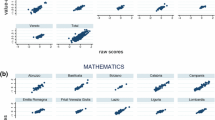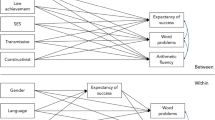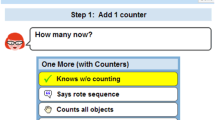Abstract
This paper investigates the influence of socio-economic status, entry style and instructional variables on post-secondary mathematics performance of internal and external students at the University of Papua New Guinea. The 1984 and 1985 intakes of Preliminary Year and Matriculation Studies were taken as samples. Six instruments were developed and administered. The data was analysed using techniques of multiple linear regression supported by “all possible subsets of regression”. Internal and external mature students' achievement in mathematics was mainly related to their entry style and partially to the instructional variables. The socio-economic status variables have no significant influence on it. The internal regular students' mathematics performance showed a stronger link with their socio-economic status than with their entry style while their instructional variables have no significant effect on their achievement. The pattern of results indicates that the performance of students can be more meaningfully grouped based on entry style rather than on mode of instruction.
Similar content being viewed by others
References
AbeyasekeraS: 1989, ‘The influence of High School assessment on first semester mathematics performance at the University of Papua New Guinea’, Science in New Guinea 15(1), 12–20.
AikenL. R.Jr: 1971, ‘Intellectual variables and mathematics achievement: directions for research’, Journal of School Psychology 9, 201–212.
BacchusM. K., EriV. and McNamaraV: 1985, Report on Upper Secondary Education in Papua New Guinea, Department of Education, Waigani.
Boon, P. K.: 1980, ‘Attitudes of staff towards mature age students’, in T. Hore and L. H. T. West (eds.), Mature Age Students in Australian Higher Education, Higher Education Advisory and Research Unit, Monash University.
BridgerP. J: 1986, ‘A longitudinal comparison of the results of the Grade 11 numeracy tests (D2 and A4) with the results of the Grade 12 Higher School Certificate Examination in Mathematics Major and Minor’, Department of Education, Waigani, Papua New Guinea.
ChildsG. B: 1966, ‘Review of research in correspondence study’, in C. A.Wedemeyer (ed.), The Bandenberg Memorial Essays on Correspondence Instruction II, University of Wisconsin, Wisconsin, pp. 126–140.
ChopraS. L: 1967, ‘Parental occupation and academic achievement of High School students in India’, The Journal of Educational Research 60(8), 359–362.
ClarksonP: 1982, ‘Some factors affecting mathematics learning in a national high school’, in P.Clarkson (ed.), Research in Mathematics Education in Papua New Guinea 1982, Mathematics Education Centre, PNGUT, Lae, pp. 13–30.
ClarksonP. and WhippyH: 1981, ‘Papua New Guinea university students attitudes to mathematics’, in P.Clarkson (ed.), Research in Mathematics Education in Papua New Guinea, Mathematics Education Centre, PNGUT, Lae, pp. 21–37.
CurryR. L: 1962, ‘The effect of socio-economic status on the scholastic achievement of sixth grade children’, The British Journal of Educational Psychology XXXII, 46–49.
Department of Education: 1985, Growth of Education since Independence: 1975–1985, Department of Education, Waigani.
Department of Education: 1989, 1988 Education Staffing and Enrolment Statistics. National Education System, National Department of Education, Waigani.
DraperN. R. and SmithH: 1981, Applied Regression Analysis, Second Edition, John Wiley and Sons, New York.
Eaton, E. G: 1980, ‘The academic performance of mature age students: a review of the general literature’, in T. Hore and L. H. T. West (eds.), Mature Age Students in Australian Higher Education, Higher Education Advisory and Research Unit, Monash University, pp. 41–47.
EdgeO. P. and FriedbergS. H: 1984, ‘Factors affecting achievement in the first course in calculus’, The Journal of Experimental Education 52(3), 136–140.
EdwardsR. K: 1972, The prediction of success in remedial mathematics courses in the public community junior college’, The Journal of Education Research 66(4), 157–160.
FredrickD., MishlerC. and HoganT. P: 1984, ‘College freshmen mathematics abilities: Adults versus younger students’, School Science and Mathematics 84(4), 327–336.
HarrisW. J. A: 1975, The Distance Tutor, Education by Correspondence, University of Manchester, Manchester.
Hartung, M. L: 1967, ‘Problems related to the curriculum and instructional methods’, in T. Husen (ed.), International Studies of Achievement in Mathematics, Vol. II, pp. 143–198.
Holmberg, B: 1982, Recent Research into Distance Education, Zentrales Institut fur Fernstudienforschung, Arbeitsbereich: Fernstudienentwicklung, Hagen.
HubbardR: 1982, ‘How mathematics is forgotten’ (mimeographed), Department of Mathematics, Queensland Institute of Technology, Brisbane.
JamesA. N. and PaffordW. N: 1973, ‘The relationship between academic achievement in science and father's occupation’, Science Education 57(1), 37–41.
JonesJ. and PopeA: 1974, Home background as a determinant of success in a Papua New Guinea High School, UPNG, Waigani, ERU Research Report No. 11.
JonesP. L. and WilkinsC. W: 1981, ‘Mathematics achievement at tertiary level: a comparative study at PNGUT’, PNG Journal of Education 17(1), 72–81.
Kaeley, G. S: 1976, ‘Three way teacher training in Kenya: A descriptive study of the inservice training of unqualified primary school teachers in modern mathematics in Kenya (1973–1974)’, Unpublished Master's Degree Thesis, University of Nairobi, Nairobi.
KaeleyG. S: 1979, ‘A case for the mature age entrants at the University of Nairobi’, Kenya Journal of Adult Education 7(2), 18–21.
KaeleyG. S: 1982, ‘Teaching mathematics at first year degree level to mature students at the University of Papua New Guinea’ (mimeographed), Department of Extension Studies, UPNG, Waigani.
KaeleyG. S: 1988a, ‘Sex differences in the learning of post-secondary mathematics in a neo-literate society’, Educational Studies in Mathematics 19, 435–457.
KaeleyG. S: 1988b, ‘Attitudes and mathematics performance of internal and external post-secondary students in Papua New Guinea’, Science in New Guinea 14(3), 144–154.
KaeleyG. S: 1989, ‘Instructional variables and mathematics achievement’, ICDE Bulletin 19, 15–30.
KeevesJ. P: 1972, Educational Environment and Student Achievement, Almqvist and Wiksell, Stockholm.
KemberD: 1981, ‘Some factors affecting attrition and performance in a distance education course at the University of Papua New Guinea’, Distance Education 2(2), 164–188.
KrutetskiiV. A: 1965, ‘Age peculiarities in the development of mathematical abilities in students’, Sovetskaia Pedagogika 11, 15–27.
LancyD. E: 1983, Cross-Cultural Studies in Cognition and Mathematics, Academic Press, New York.
McIntoshN. and V.Morrison: 1974, ‘Student demand, progress and withdrawal — an analysis of the Open University's first four years’, Higher Education Review 7(1), 37–69.
MosesI: 1978, ‘Mature age students — are they really different?’ in S.Knights (ed.), Returning to Study: The Mature Age Student, Sydney University Extension Programme, Sydney, pp. 69–86.
MossJ. D: 1982, Towards Equality: Progress by Girls in Mathematics in Australian Secondary Schools, Occasional Paper No. 16, Australian Council for Educational Research, Hawthorn, Microfiche No. ED 213 604.
MowbrayD. and KemberD: 1981, ‘Performance of preliminary year students in 1980, compared to Grade 10 results’, (mimeographed), Biology Department, UPNG, Waigani.
National Planning Office: 1984, The National Public Expenditure Plant 1985–88, National Planning Office, Waigani.
Nelson, H: 1966/67, ‘The University's first year’, New Guinea, December and January, pp. 19–27.
RosL: 1984, ‘Monitoring standards in mathematics of the Grade 10 output—Research Report 1983’ (mimeographed), Mathematics Department, Goroka Teachers College, Goroka.
SilveyJ: 1978, Academic Success in PNG High Schools, UPNG, Waigani, ERU Research Report No. 26.
SkempR. R: 1971, The Psychology of Learning Mathematics, Penguin Books, Harmondsworth, Middlesex, England.
Thomas, E. B: 1976, ‘A comparative study of senior High School students in Papua New Guinea and Western District of Victoria’, Unpublished Ph.D. Thesis, UPNG.
TuppenC. J. S: 1981, School and Student Differences: Grade Ten Examination and Assessment Results, UPNG, Waigani, ERU Research Report No. 39.
WeeksS. G: 1977, The Social Background of Tertiary Students in PNG, UPNG, Waigani, ERU Research Report No. 22.
WeeksS. G: 1978, Youth in their Villages, UPNG, Waigani, ERU Research Report No. 24.
WeeksS. G: 1985, ‘Students and background: A literature review’, in M.Bray and P.Smith (eds.), Education and Social Stratification in Papua New Guinea, Longman Cheshire Pty Ltd, Melbourne, pp. 98–109.
WhiteK. R: 1982, ‘The relation between socioeconomic status and academic achievement’, Pyschological Bulletin 91(3), 461–481.
WilsonA: 1986, ‘Science students at risk: A Papua New Guinea analysis’, PNG Journal of Education 22(2), 141–152.
Author information
Authors and Affiliations
Rights and permissions
About this article
Cite this article
Kaeley, G.S. The influence of socio-economic status, entry style and instructional variables on the learning of mathematics in a neo-literate society. Educ Stud Math 21, 319–350 (1990). https://doi.org/10.1007/BF00304262
Issue Date:
DOI: https://doi.org/10.1007/BF00304262




